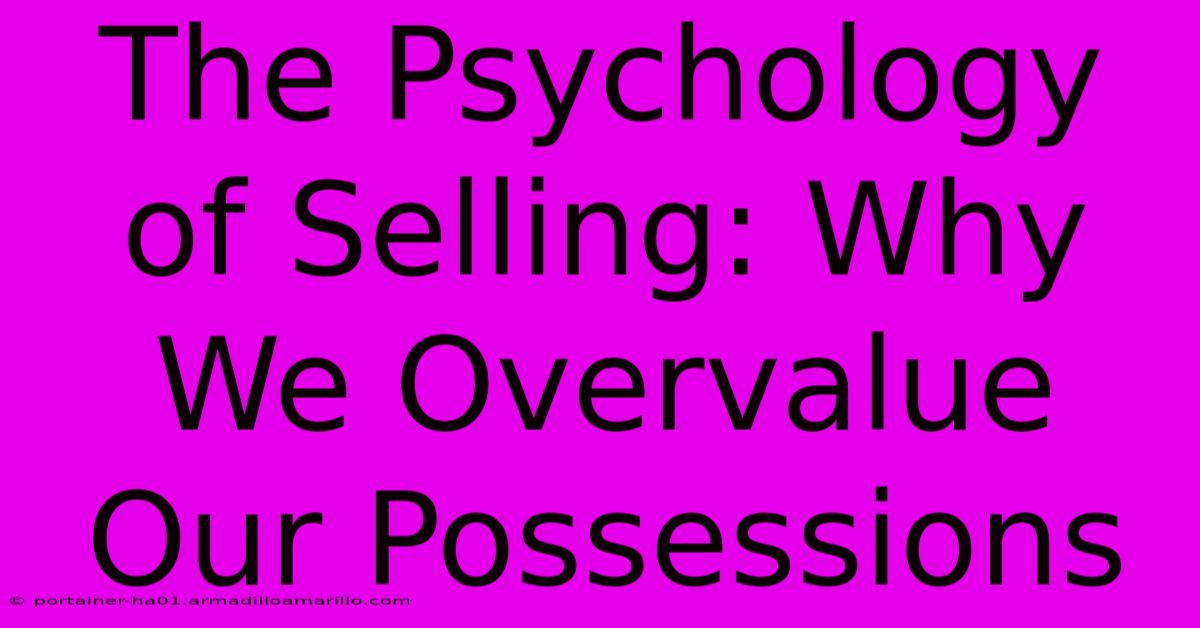The Psychology Of Selling: Why We Overvalue Our Possessions

Table of Contents
The Psychology of Selling: Why We Overvalue Our Possessions
Selling something you own can be surprisingly difficult, even if it's something you no longer need or use. Why is this? The answer lies in the fascinating psychology behind our relationship with our belongings. We often overvalue our possessions, a phenomenon with deep-seated emotional and cognitive roots. Understanding this psychology is crucial, both for successfully selling your items and for making better purchasing decisions in the future.
The Endowment Effect: Why "Mine" Feels More Valuable
At the heart of this overvaluation lies the endowment effect. This well-documented psychological bias describes our tendency to place a higher value on things we already own compared to things we don't. Once something becomes "ours," it acquires a sentimental value that goes beyond its objective worth. Think about that old t-shirt – it might be faded and worn, but it holds memories, representing a specific time or event in your life. This emotional attachment inflates its perceived value in your mind, making it harder to let go at a price that reflects its actual market value.
Loss Aversion: The Pain of Letting Go
The endowment effect is closely linked to loss aversion, another powerful psychological principle. People tend to feel the pain of a loss more strongly than the pleasure of an equivalent gain. Selling something feels like a loss – a loss of a possession, a loss of a memory, a loss of a part of your identity. This feeling can lead us to demand a higher selling price than is realistically attainable, hindering the selling process.
The Power of Framing and Mental Accounting
How we frame the sale also impacts our perception of value. If we focus on the money we'll receive, the sale might seem more appealing. But if we focus on the loss of the item, the emotional attachment becomes dominant, making it harder to accept a lower offer.
Mental accounting further complicates matters. We tend to categorize our finances mentally, assigning different values to different "accounts." The money from selling a possession might be mentally earmarked for a specific purpose, making us less willing to compromise on the price to secure a quicker sale.
Combating Overvaluation: Strategies for Successful Selling
Understanding these psychological biases is the first step towards successfully selling your possessions. Here are some strategies to help overcome the emotional barriers:
1. Detach Emotionally:
Before listing your item, try to consciously separate your emotional attachment from its objective value. Focus on its market value, considering comparable items sold recently. Take photos that highlight its features, but don't dwell on personal memories associated with it.
2. Set a Realistic Price:
Research comparable items on online marketplaces to establish a fair market value. Be willing to negotiate within a reasonable range. Accepting a slightly lower price is often better than having the item sit unsold for an extended period.
3. Focus on the Gains:
Shift your focus from what you're losing to what you're gaining. Think about how the money from the sale can contribute to a new purchase, a debt payment, or a fun experience. This positive framing can make the selling process feel less like a sacrifice.
4. Seek Objective Feedback:
Ask a friend or family member to review your listing and provide an objective opinion on the price and presentation. Their unbiased perspective can help you identify any potential issues that might be deterring buyers.
Conclusion: Selling Smartly
Overcoming the psychological barriers to selling requires self-awareness and a strategic approach. By understanding the endowment effect, loss aversion, and the impact of framing and mental accounting, you can navigate the selling process more effectively, achieving better results and freeing yourself from the emotional baggage attached to unwanted possessions. Remember, selling isn't just about getting rid of things; it's about reclaiming your space and resources, opening up opportunities for new experiences and acquisitions.

Thank you for visiting our website wich cover about The Psychology Of Selling: Why We Overvalue Our Possessions. We hope the information provided has been useful to you. Feel free to contact us if you have any questions or need further assistance. See you next time and dont miss to bookmark.
Featured Posts
-
Wireframes Gone Wild Discover The Treasure Trove Of Data At Your Fingertips
Feb 07, 2025
-
Exclusive Interview Tech Insider Reveals The Future Of The Internet
Feb 07, 2025
-
The White Space Advantage Revolutionize Your Flyers With Empty Effective Marketing
Feb 07, 2025
-
Landscape Vs Portrait Which Orientation Will Elevate Your Photography
Feb 07, 2025
-
Revolutionize Your Wireframes Introducing The Game Changing Data Catalog
Feb 07, 2025
